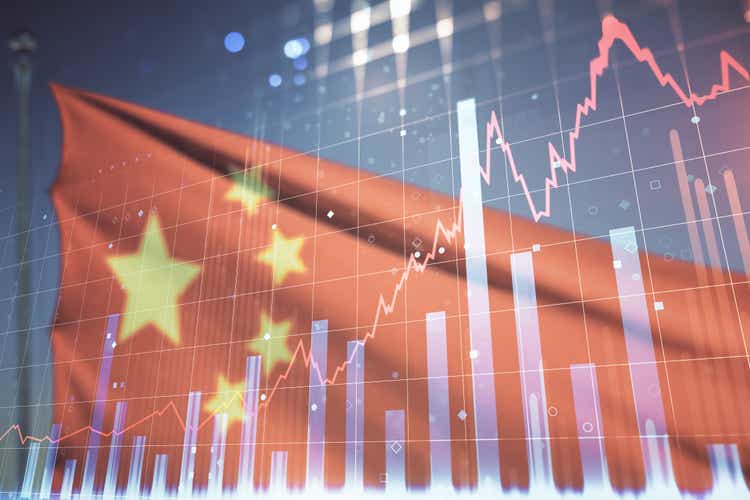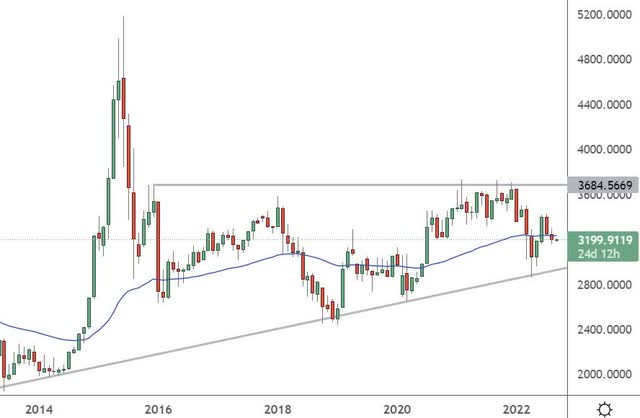Igor Kutyaev
In this article, I will discuss the outlook for China shares (SHCOMP) in light of a recent regulatory deal.
China stocks have outperformed Europe despite domestic issues
I wrote an article back in January that urged investors to sell European shares. The Dax index (DAX) has since dropped by almost 19%, while the S&P500 is down 12.24%. In the article, I also said that Chinese shares could benefit from a flight to safety and the Shanghai index is down only 8.57%.
At the time I noted energy and inflation as problems:
“Governments in Europe are taking action to tackle the energy price hikes but that is not expected to cover more than a quarter of the price hikes after wholesale prices rose 300% for European gas. This is also tied to Russia, with 30% of European gas coming from Russia, via Ukraine. If tensions boiled over, it is not inconceivable that Russia turns off the taps.”
As we have seen with the energy market, Russia has continued to reduce supply to Germany and that has resulted in real fears for the European economy. One of the country’s largest gas firms has warned of rationing this week.
“We cannot rule out that Germany might look at rationing gas as something that might have to be considered,” Uniper CEO Klaus-Dieter Maubach said.
“We know that the government wants to avoid this as much as possible because that would be a disaster for so many reasons,” he added.
Energy prices are still being pressured by Russian supply and that will continue to weigh on European markets heading into the winter. That leaves investment looking for a destination.
At the time of my article, I noted that Barclays expected a rate rise from the ECB in 2023, but they meet again this week, with analysts expecting a blockbuster 75 basis point hike. An aggressive ECB will add to the weight of European shares and increase recession risks.
China/U.S. audit deal raises investor hope
Chinese stocks received a boost recently from a proposed audit agreement between Chinese and U.S. regulators.
The agreement would allow U.S. auditors access to Chinese company finances, which would remove recent fears of Chinese firms being delisted. Under the 2020 Holding Foreign Companies Accountable Act, the Securities and Exchange Commission threatened over 200 Chinese companies with delisting by 2024 without access to independent audits.
However, there is still some early caution about seeing actual cooperation. According to the WSJ:
“PCAOB insists that its audit inspections will be wholly independent of Chinese authorities, with no requirement for consent from the Chinese government. The China Securities Regulatory Commission insists that “audit work papers and other information that the U.S. regulator needs access to will be obtained by and transferred through Chinese regulators.” The CSRC also says that a Chinese regulator may “assist” in any interviews or testimonies Chinese personnel give during audit inspections.”
They summarized that the agreement, “looks to be little more than window dressing. It may allow Chinese companies to remain on U.S. stock exchanges, but there’s no reason to think they’ll be rigorously audited.”
That may be somewhat pessimistic as the wheels are at least turning on some cooperation.
Taiwan and the U.S. dollar provide a headwind
Despite the potential for Chinese stocks, there are still headwinds. The soaring U.S. dollar has hit 20-year highs and the Federal Reserve has aggressively raised rates. That is an incentive for U.S. investors to remain in domestic markets in the near term.
However, another big problem for investor appetite is Taiwan. After a tense diplomatic visit from U.S. politicians recently, hostility between the two sides remains. This week saw a deal by the United States to sell $1.1bn of arms to the Asian country. Taiwan has agreed to purchase military equipment which includes anti-ship and air-to-air missiles in a move that angered Beijing.
China said the deal “severely jeopardizes China-US relations and peace and stability across the Taiwan Strait. China will resolutely take legitimate and necessary counter-measures.”
Having watched the Russia sanctions play out, an escalation of tensions in the Taiwan Strait could lead to pressure on institutional investors. A recent Washington Times article has already suggested that with the tagline: “It’s past time to implement every possible tool to halt the funding of a military adversary.”
The piece singled out firms like BlackRock (BLK) and Vanguard for holding exchange-traded funds (“ETFs”) that “…contain Chinese companies involved in the building and modernization of China’s military.”
There are also domestic problems with continued lockdowns and a weakened property sector. BlackRock itself has been joining other firms in cutting exposure to Chinese junk bonds. But there are hopes of a bottom in that market after recent government intervention. An August rate cut and other measures saw China’s high-yield dollar bonds having their best returns in 10 years.
The Chinese stock market is still lower than its 2015 highs, with prices locked in a tight range since 2016. The upside resistance is at 3,700 while an uptrend line from 2013 sits around the 2,900 level.
Conclusion
Chinese stocks have outperformed the U.S. and Europe since the January selling. The outlook is still negative for Europe heading into the winter, but there are still obstacles to significant institutional investment in the mainland. A rising U.S. dollar and interest rates are boosting domestic investment opportunities, while Taiwan tensions remain. This could see pressure on Wall Street firms to stay away despite the recent U.S. and China audit deal. There is definitely a case for considering China stocks over Europe, but U.S. stocks could have a greater pull in the near term.



Be the first to comment